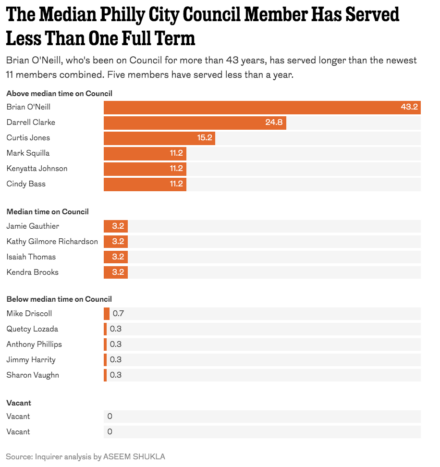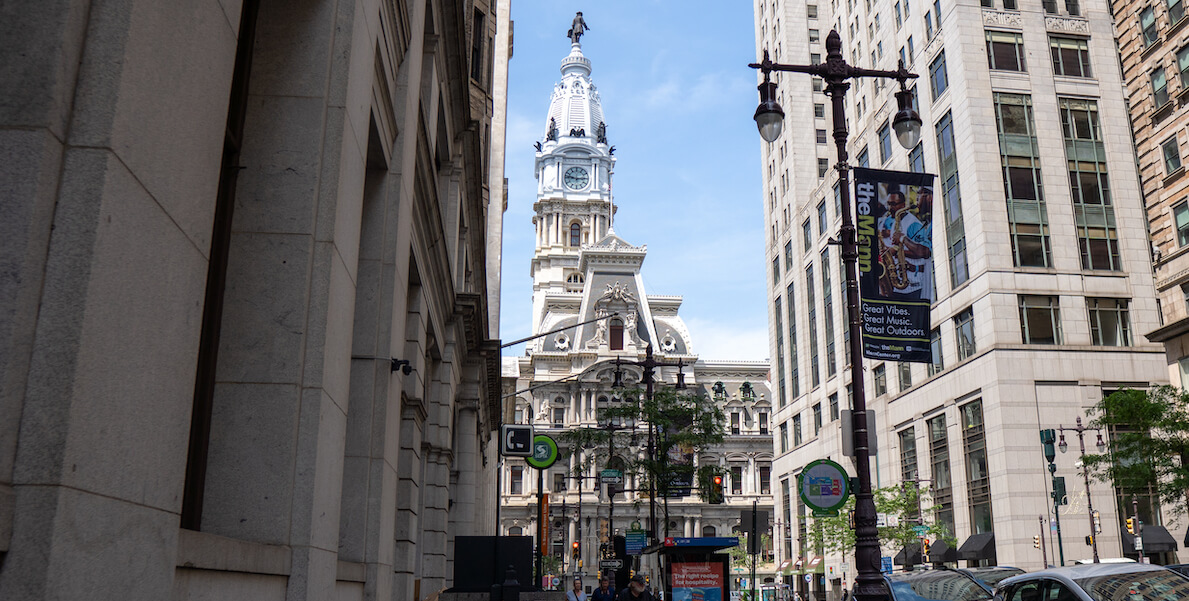Philadelphia’s next City Council will be one of the youngest and least-experienced in recent history, according to an analysis by Max Marin and Aseem Shukla at The Inquirer.
The wave of resignations from members who are running for Mayor, combined with the turnover since the 2019 election, have greatly reduced the average age of the current members. Fewer of them have much longevity working in government. Twelve of the members elected in 2023 will not have been in office during Mayor Kenney’s first term.
As Marin and Shukla write, this isn’t a bad thing on its own.
Fine young Council-ables
But the scale of the turnover does raise some important questions about how quickly a brand new Mayor, with brand new City Council leadership, and a plurality-new City Council membership body, will be able to get into the groove of governing together with so many challenging public problems to solve.
“This election comes amid intense public pressure over violent crime, ailing city services, and a pandemic-battered economy, and as many residents say the city is headed in the wrong direction.
‘We’re going to be on shaky footing going into 2024,’ said political consultant Mustafa Rashed. “Since the change is going to be across the board, I think voters are going to be looking for a balance of new ideas and proven experience.”
Councilmembers Curtis Jones, Kenyatta Johnson, Cindy Bass, and Mark Squilla — the most senior Democratic members likely to be returning next year — are all reported to be seeking the Council Presidency. All are expected to have somewhat different leadership styles from Council President Clarke. On the next rung down in seniority are Katherine Gilmore-Richardson, Isaiah Thomas, Jamie Gauthier, and Kendra Brooks.
Tenth District representative Brian O’Neill has been a Councilmember longer than everyone. But as a Republican, he is not in line for important leadership positions.
With so many pressing and complex problems facing the city, candidates who have more city government experience and knowledge or relevant executive experience dealing with the city administration are more likely to be successful and productive leaders in the next City Council. It’s important for voters to choose representatives with the qualities Mustafa Rashed mentions: new ideas and proven experience.

There are several candidates who would bring fresh ideas to city government without the disadvantage of being completely green when it comes to getting things done in City Hall.
But the same can’t be said for every candidate in the top tier of contenders, some of whom are running mainly on their opinions, biography, or endorsements from interest groups, but lack the depth of experience where voters could expect them to hit the ground running in the same way.
The City Council that works together …
Relatedly, it’s important for voters to consider which of the candidate choices on offer would work the best together. Some voters may be tempted to send a more mixed-bag slate of individuals with very different views from one another to City Hall to hash things out. But one of the most important considerations this year is to pick a Mayor and Council who generally agree on a political direction, and will row the same way together.
Mayors Nutter and Kenney spent a lot of time grinding their gears, struggling to get their priorities passed through a recalcitrant City Council where Council President Clarke was starting out very suspicious of Mayoral priorities in general, with an inclination to trim the Mayor’s sails. It’s hard to imagine what this would even look like from the standpoint of today. But it would be much better to give the new Mayor a City Council majority with a more pragmatic outlook, and a more cooperative attitude toward advancing shared goals.
That isn’t to say the next Council should be a rubber stamp. Even if Council were serving alongside a Mayor with directionally-similar politics, it’s very difficult to imagine newcomers like Eryn Santamoor, Job Itzkowitz, or Donavan West, or younger Councilmembers such as Isaiah Thomas or Katherine Gilmore-Richardson, ever letting policy details slide and becoming patsies for the administration.
It’s important to vote for a slate of candidates who have a desire to hold city government to a higher standard in order to achieve better day-to-day life outcomes for the people of Philadelphia — and won’t be content to support feel-good ideas with the details half thought through. You want to be able to trust Council’s newest members to do their homework, even when they might agree on a bill’s direction.

Jon Geeting is the director of engagement at Philadelphia 3.0, a political action committee that supports efforts to reform and modernize City Hall. This is part of a series of articles running on both The Citizen and 3.0’s blog.
![]() MORE FROM JON GEETING ON WHAT’S AT STAKE IN OUR NEXT ELECTION
MORE FROM JON GEETING ON WHAT’S AT STAKE IN OUR NEXT ELECTION



